It should come as no surprise as anyone that I’m a dog training and behaviour nerd. How do their brains work? How do they process the world? What do they want? I’m obsessed.
I’ve mentioned before that I took Brian Hare’s Dog Emotion and Cognition course through Coursera, as well as buying his book, The Genius of Dogs. I was torn about it; his studies about how dogs learn and their domestication are fascinating, but his knowledge of training is woefully lacking and, rather than acknowledging that, he states things that are incorrect as fact; he is equal parts interesting and cringe-worthy. I’m sure he’s a very smart man, but damn do I wish he’d stick to talking about things he’s actually educated in. I was obviously interested in trying out his Dognition work but, frankly, given how much time I dedicate to training and dog related work, and given how torn I was about him, I was hesitant to spend the money.
Then, by chance, Emma Tecwyn, a postdoctoral fellow at the University of Toronto, got in touch with us at When Hounds Fly, about her research in canine cognition. She wanted to use our space to run some labs, and obviously I jumped at the chance to participate with Athena.
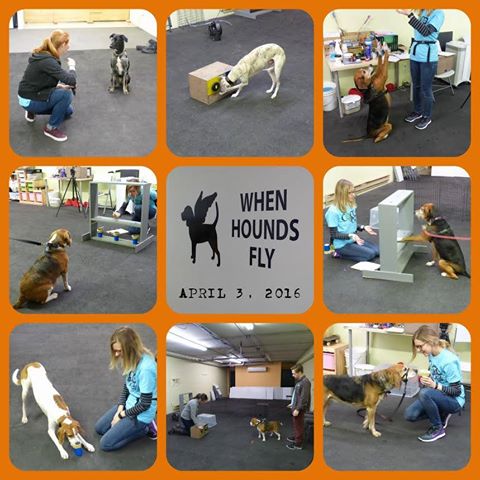
Here’s the study in brief:
During this session, your dog will participate in a study exploring dogs’ learning and reasoning abilities. We investigate a dog’s learning in a variety of contexts including dogs’ physical problem solving abilities (eg. how to get a treat out of a puzzle) and their understanding of social information (eh. following a pointing gesture or learning from a demonstration). Our research takes the form of short, interactive games that are designed to be fun and engaging to dogs. We record dogs’ actions when interacting with people, toys and puzzles, and the choices they make, to learn more about their understanding of the world.
Cool side note: she’s done these same tests with toddlers and monkeys, on top of dogs!
Athena participated for two tests. It was adorable; the whole thing lasted roughly 40 minutes and, if you haven’t heard, dobermans are basically velcro dogs, incredibly attached to their humans. So between each repetition of the puzzle games, she’d swing around to me, head butt me, then go back to work; very obvious she’s used to working with me and only me. Half endearing, half embarrassing.
The first test was a box that she had to turn a wheel to dispense a treat.
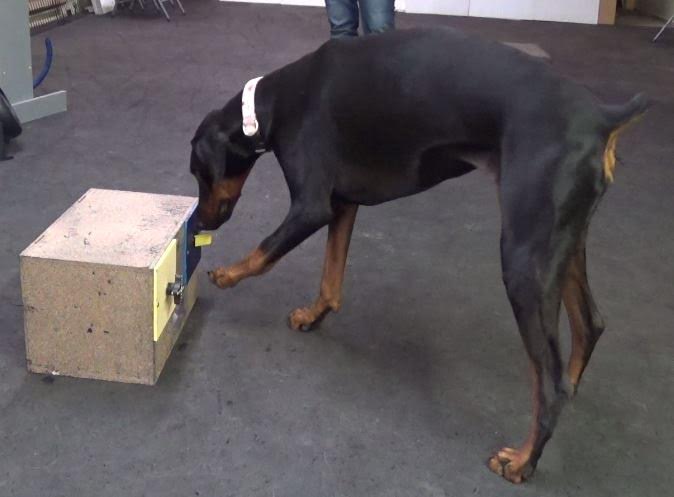
She figured it out pretty quickly. It was really cool to watch. I’m honestly not sure that she is “smart” versus used to interacting with objects and problem solving thanks to our nearly four years of training, but she had a good time with it.
The second test was a set up with two cups, and a tube that would dispense a treat into one of them.
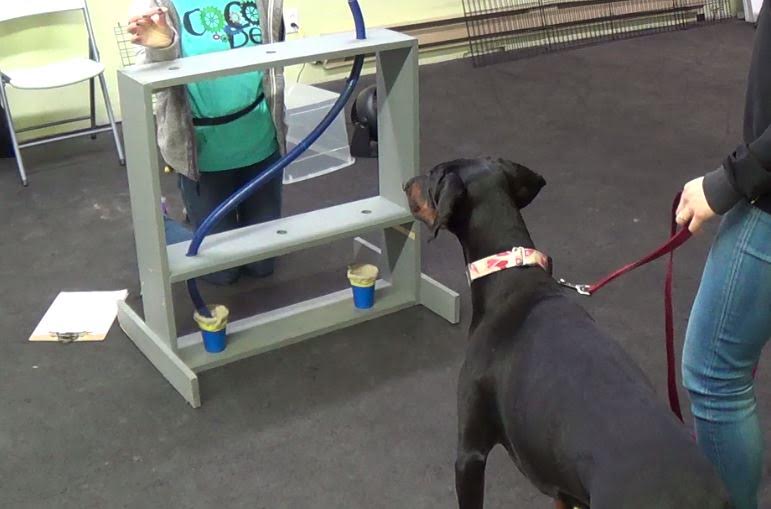
To be honest, I was shocked by how hard a time she had with this. MY DOG IS PERFECT OBVIOUSLY but I legitimately thought she’d figure this out quickly. She quickly got five straight wrong, then figured it out and got five straight right.
Here’s why this surprised me: in Brian’s course, we learned that dogs are socially intelligent, meaning they figure out things like pointing and eye contact even when “smarter” creatures (like chimps) don’t. I assumed she’d view the tube as a “point” to the correct cup, but she just didn’t. This concept was beyond her.
Here’s a cool thing though! At the end of her turn, I had them drop a cup in the other cup – the one on the right – after she’d guessed left five times in a row from figuring it out. And she immediately went right. So whether she can figure it out without the tube or whether she had figured the game out, the interesting thing, to me at least, is that she definitely wasn’t guessing. Smart girl.
This is all amazing to me, as a behaviour nerd. But I get it – some of you aren’t. You just want to take care of your dogs. But let me tell you: dogs love puzzles. A lot.
So whether your dog is a working-dog-doberman, a super-smart-poodle, or an adorably-squishy-pug, here are some of my favourite puzzle toys for dogs, for day-to-day fun or for rainy days:
- The KONG Wobbler
. I don’t feed Athena from a bowl. This keeps her busy for more time, so I can get stuff done, and keeps her and her brain moving.
- The Buster Activity Mat. I just got this for Athena – and several of the “extra” puzzles last week. It is my new favourite puzzle toy, and she goes crazy for it. I cannot recommend this highly enough.
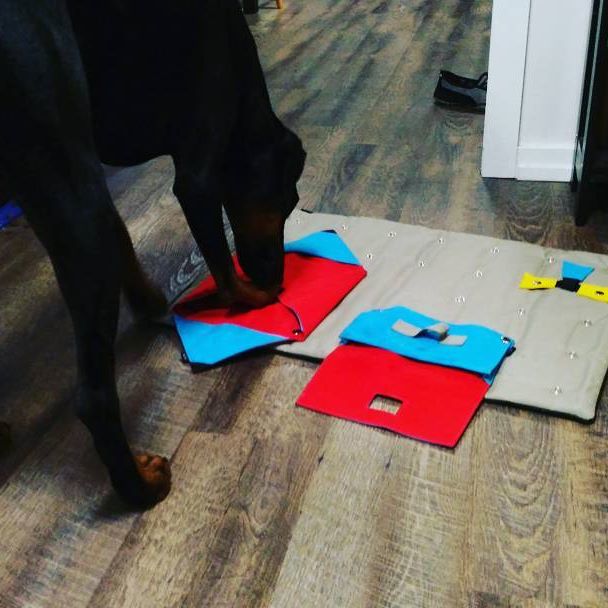
- Dog Puzzle Toy
I like this one in that it is wood, so very natural and more durable than plastic toys; however, Athena figured it out in about five minutes flat and has been bored by it ever since.
- West Paw Design Toppl Toy
is basically my favourite toy ever. Not that complicated but SUPER durable. I will stuff this with anything freezable (read: peanut butter, ground beef, cottage cheese, wet dog food) and it takes Athena a good half hour to get through.
- Basically anything by Outward Hound
is great; the only downside being they are all plastic. If you have a dog who is a chewer, like mine, she’ll destroy them in ten seconds flat, versus any of the above.
Here’s to smart puppies!

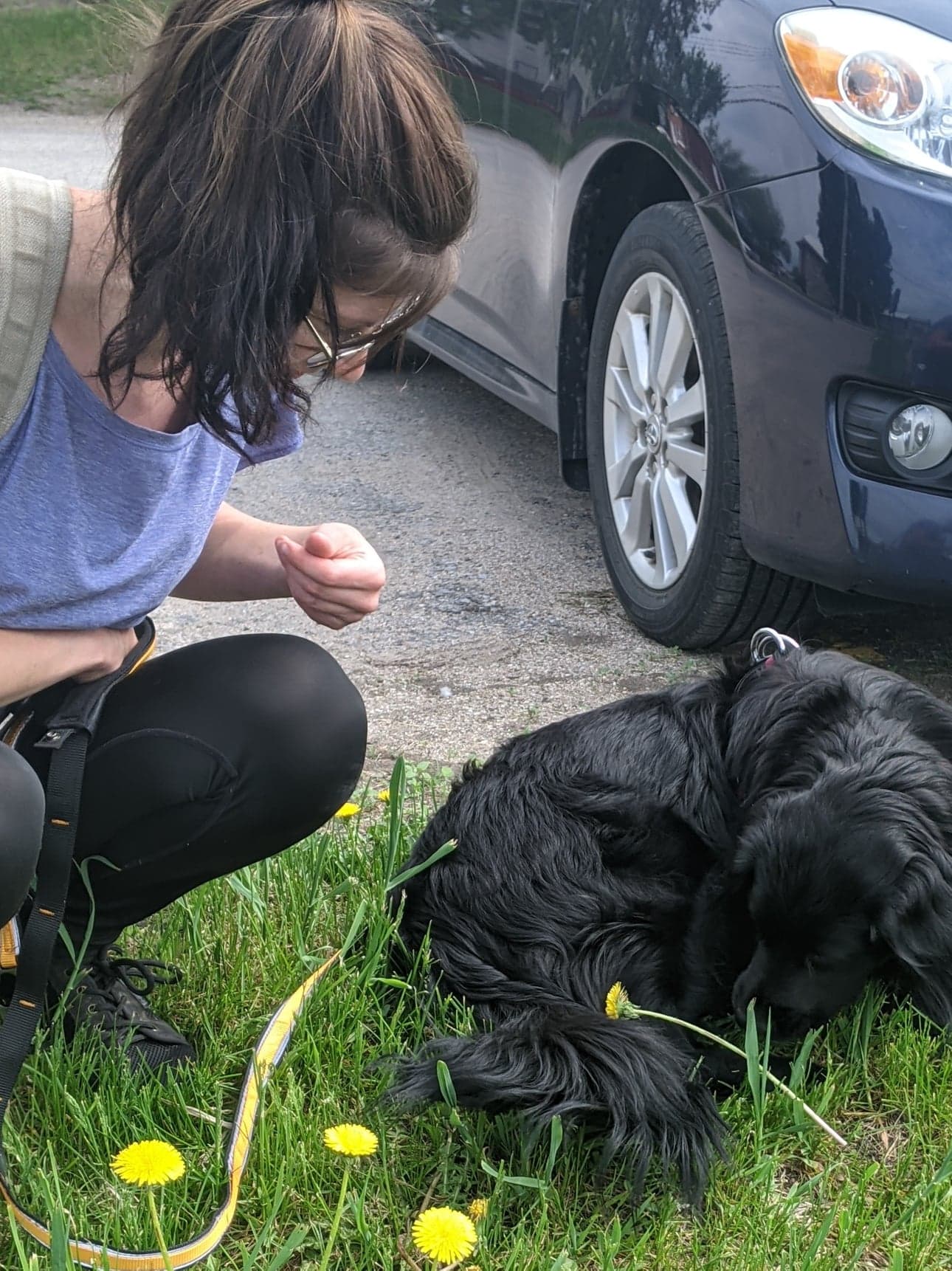
Neat! I’ll have to try some of these games with Gambit! Entertainingly, just because he’s part border collie, does *not* make him good at puzzles. He loves attempting puzzles and barking at them though.